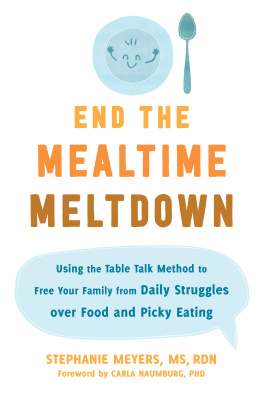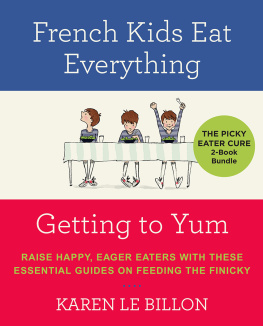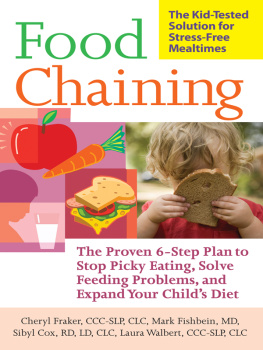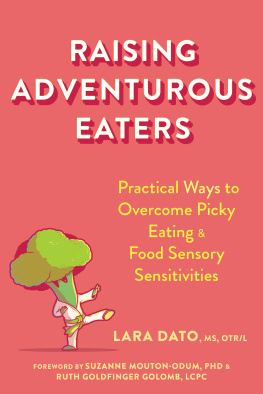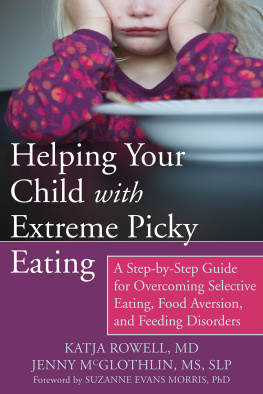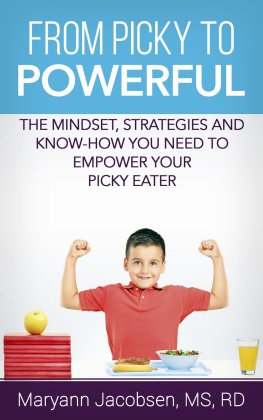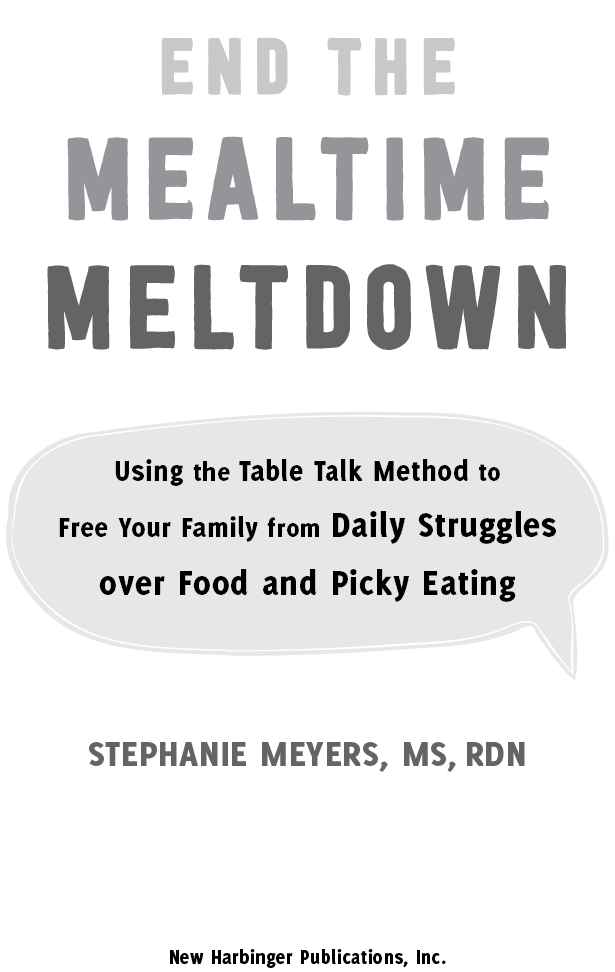As a former English teacher, I am keenly aware of the power of words to shape our thoughts and feelings. Meyers offers practical language tweaks for parents and guardians who want to foster a healthy relationship with food and enjoy more peaceful family meals.
Oona Hanson, MA, MA , educator and parent coach, and family mentor at Equip Health
End the Mealtime Meltdown is a unique guide to avoiding food fights with your child. In a calm and reassuring tone, Stephanie Meyers provides tips, tools, and strategies that make eating with kids more peaceful for everyone involved. Meyerss Table Talk Method replaces parental prodding and cajoling with an open communication style that lays the foundation for a childs healthy relationship with food now, and in the future.
Elizabeth Ward, MS, RDN , author of Expect the Best
One of the most important things Ive learned from this book is that helping kids have a healthy relationship with food involves encouraging curiosity around new and different types of food. Stephanie shows you how engaging your children with questions around the way ingredients look, taste, or feel can be a gateway to having them accept that food.
Leigh Belanger , author of My Kitchen Chalkboard
Where was this thoughtful book twenty years ago when I was raising my kids? This much-needed resource should be on every parents and grandparents reading list to prepare for the years of joyful family mealtime gatherings ahead of them. Food should be loved, embraced, and enjoyed, and Meyers nailed it in this soon-to-be classic for raising healthy eaters.
Joan Salge Blake, EdD, RDN, FAND , Boston University nutrition professor; author; media personality; and host of the nutrition and health podcast, Spot On!
For parents who are committed to raising a generation of healthy eaters, this is an important tool! The book provides creative, stress-free techniques for reducing common but frustrating food struggles at mealtimes. Her practical advice and realistic expectations show parents how to effectively communicate with children to create enjoyable, peaceful mealtimes at last!
Susan Albers, PsyD , psychologist, and New York Times bestselling author of Eating Mindfully , 50 Ways to Soothe Yourself Without Food , Eating Mindfully for Teens , and Hanger Management
Refreshing and revolutionary! This book is a gift for families as it brings joy, curiosity, and connection back to mealtime. Stephanie Meyerss approach is brilliantgrounded in evidence and practical experienceweaving together her deep knowledge of nutrition counseling, mindfulness, and parenting to break old, unhelpful habits and replace them with new, healthy ways of relating and eating that can last a lifetime.
Susan Bauer-Wu, PhD, RN , president of the Mind & Life Institute, and author of Leaves Falling Gently
Publishers Note
This publication is designed to provide accurate and authoritative information in regard to the subject matter covered. It is sold with the understanding that the publisher is not engaged in rendering psychological, financial, legal, or other professional services. If expert assistance or counseling is needed, the services of a competent professional should be sought.
NEW HARBINGER PUBLICATIONS is a registered trademark of New Harbinger Publications, Inc.
New Harbinger Publications is an employee-owned company.
Distributed in Canada by Raincoast Books
Copyright 2022 by Stephanie Meyers
New Harbinger Publications, Inc.
5674 Shattuck Avenue
Oakland, CA 94609
www.newharbinger.com
The Basic Mindful Eating Meditation is reprinted with permission, from Mindful Eating (2009) by Jan Chozen Bays.
Ellen Satters Division of Responsibility in Feeding is reprinted with permission.
Cover design by Amy Daniel; Acquired by Jess OBrien; Edited by Brady Kahn
All Rights Reserved
Library of Congress Cataloging-in-Publication Data
Names: Meyers, Stephanie, author.
Title: End the mealtime meltdown : using the table talk methoutrd to free your family from daily struggles over food and picky eating / Stephanie Meyers, MS, RDN.
Description: Oakland : New Harbinger Publications, 2022. | Includes bibliographical references.
Identifiers: LCCN 2021057648 | ISBN 9781684039463 (trade paperback)
Subjects: LCSH: Children--Nutrition. | Children--Nutrition--Psychological aspects.
Classification: LCC RJ206 .M684 2022 | DDC 613.2083--dc23/eng/20211221
LC record available at https://lccn.loc.gov/2021057648
To Michael, Hava, and Solin. Being at the table with you feeds my soul.
Contents
Foreword
I once got into a power struggle with my daughter over a bite of quinoa. I dont mean a spoonful of quinoa. I mean an individual grain. If you have never looked at a single grain of quinoa, its minisculefar too small for my daughter to actually taste but apparently not too small for me to overlook in my ongoing quest to get my toddlers to try new foods. Needless to say, it wasnt one of my finer parenting moments.
Thankfully, our food-related power struggles have decreased significantly over the past decade. But I still find myself nagging, bribing, bargaining, and counting bites with my tween-age daughters more often than Id like to admit. I know these strategies are ineffective, but when my brain starts worrying about the girls health and eating habits, I dont know what else to do.
At least, I didnt until I heard about Stephanie Meyers brilliant concept of table talk. This book is unlike any other one Ive read on the topic of feeding childrenand Ive read a lot of them! Meyers doesnt offer advice on how to craft the perfect meal or sneak vegetables into meatloaf. She doesnt scare readers with statistics about childhood obesity and the risk of eating disorders. And thankfully, Meyers doesnt shame or blame parents who are struggling to raise healthy children in a culture that demands perfection while inundating us with contradictory messages about what and how to feed kids.
Rather, Meyers draws on her vast professional and personal experience as a nutritionist and mother to provide readers a simple, straightforward plan that will dramatically change the dynamic at your family tablefor the better. Amazingly enough, it doesnt involve a single recommendation as to what we should feed our kids. Rather, Meyers focuses on how we interact with our children. By changing the way we talk to them about what theyre eating, while theyre eating, we can transform their relationship with food and end the painful power struggles.
Rather than harassing our kids about their food, readers are encouraged to engage their children with questions and prompts such as What do you notice? and Tell me about Each time we make space for growing eaters to get curious about their food and connect with their experience of it, were disabling their defensiveness and supporting their budding gastronomic intelligencetheir inner wisdom and awareness of eating. Fortunately for those of us who get stressed, confused, or overwhelmed by the mere mention of gastronomic intelligence, Meyers provides us with a clear plan for precisely how to proceed.
After reading about the Table Talk Method, I found myself moving from a place of reactive, anxiety-fueled comments and suggestions to a calmer, more curious way of speaking to my kids about the food on their plates. By exploring my daughters eating experience with them, Im supporting them in trying new foods and finding foods they enjoy, as Meyers notes, to break up frenetic energy and nip meltdowns in the bud. Each time Im tempted to remind my girls that they didnt even try their salmon and they might actually like it this timea tactic which has never once worked in the history of my parenting experienceI can ask them what theyre noticing, whats not working for them, and what might help. Instead of nagging my girls to try just one more bite of chicken or rice, I can ask them what their plan is for the food left on their plate, which unused food we should keep, and how we might use it later. Instead of triggering a tense negotiation over every bite, Im learning to empower my daughters to make intentional choices rather than reactive decisions. And Im learning to do the same for myself along the way.

